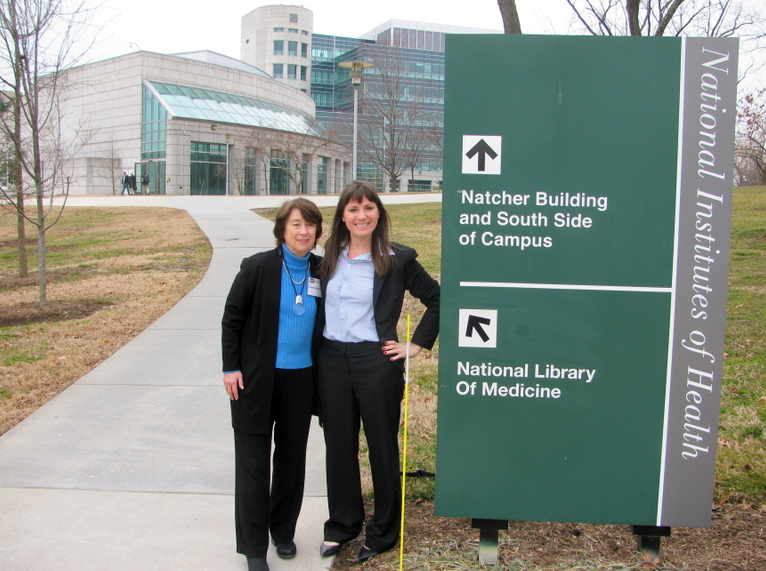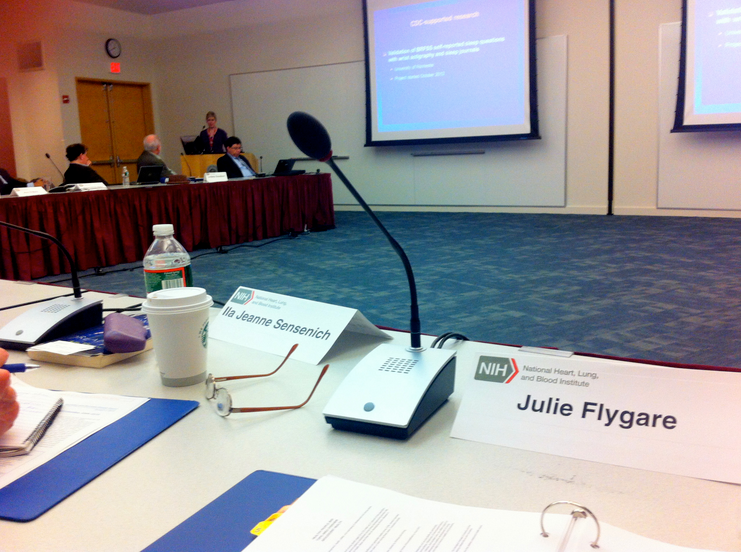Julie Flygare Represents Narcolepsy at NIH & NIH’s Funding of Hypocretin Orexin Agonists for Narcolepsy Treatment
 The 36th meeting of the Sleep Disorder Research Advisory Board (SDRAB) took place on Feb. 25 – 26, 2013 on the National Institutes of Health (NIH) Campus in Bethesda, MD. The current Board is comprised of five sleep researchers and four patient representatives, including yours truly, the REM Runner! Ad-hoc participants include Michael Twery, Ph.D., Director of the National Center on Sleep Disorders Research, along with trans-NIH representatives from institutes, centers and offices interested in sleep research.
The 36th meeting of the Sleep Disorder Research Advisory Board (SDRAB) took place on Feb. 25 – 26, 2013 on the National Institutes of Health (NIH) Campus in Bethesda, MD. The current Board is comprised of five sleep researchers and four patient representatives, including yours truly, the REM Runner! Ad-hoc participants include Michael Twery, Ph.D., Director of the National Center on Sleep Disorders Research, along with trans-NIH representatives from institutes, centers and offices interested in sleep research.
The two-day meeting featured presentations and comments from various stakeholders including the Center for Disease Control (CDC), the Federal Motor Carriers Safety Administration, the Sleep Research Society (SRS), the American Academy of Sleep Medicine (AASM), the National Sleep Foundation (NSF), the American Sleep Apnea Association (ASAA) and the Circadian Sleep Disorders Network (CSD-N).
As a group, we looked at current sleep research and future opportunities and priorities. Topics included:
- updates on the 2011 Sleep Disorders Research Plan
- school start times
- drowsy driving
- Healthy People 2020
- sleep education and public awareness campaigns
NIH Funds Hypocretin/Orexin Agonists for Narcolepsy Treatment:
We discussed NIH’s recent five-year cooperative agreement with Reset Therapeutics to develop hypocretin/orexin receptor agonists for the treatment of narcolepsy. (Full project details here)
This award was made through NIH’s Blueprint Neurotherapeutics Network, which was established in order to bridge the gap in neuroscience-related drug development between academic and industry research. Reset Therapeutics is leveraging its expertise in circadian rhythms biology to develop the hypocretin/orexin receptor agonists.
Hypocretin/orexin plays a key role in the body’s normal sleep/wake cycles. This approach is designed to address the molecular cause of narcolepsy and may someday be the gold standard for narcolepsy treatment.
In closing, I’d like to thank our Board chairperson – Sairam Parthasarathy, M.D. and NCSDR Director – Michael Twery, Ph.D. I enjoyed getting to know my fellow Board members – researchers and patient reps alike. It was truly a team effort – with everyone respecting each others’ points of view. I am honored to be on this team – and I look forward to the next meeting!
A few photos:
 Julie with fellow SDRAB member and athlete-extraordinaire, Ila Sensenich
Julie with fellow SDRAB member and athlete-extraordinaire, Ila Sensenich
 Julie with NSF’s Kristin Jones (fellow sleep advocate and my role model)
Julie with NSF’s Kristin Jones (fellow sleep advocate and my role model)

That’s so great that you were able to represent the narcolepsy community at this research advisory board.
So proud of you!
Thank you, Alex! It’s such an honor to represent narcolepsy on the NIH advisory board. 🙂
Once again, thank you so much for everything that you do to represent us PWN! I, for one, greatly appreciate how much work you do for the rest of us! You’re an inspiration! <3
Thank you, Julie Ann! Your support means so much to me.
Julie,
I want to echo the other’s comments – Thank you SO very much for representing PWN (myself included). Your strong presence and profound knowledge and understanding uniquely qualify you to be the voice for those of us whose voices normally go unheard.
Thanks again and keep up the important work!
3/6/13
Julie:
I don’t know how you get all of your energy, but you have pushed awareness of narcolepsy to levels I long thought impossible. Please keep it up on behalf of all of us.
Matt Landy
Thank you, Matt!!
This past week was a test of durability for sure. After the SLEEP WALK, my whole body ached with exhaustion – but it was in pursuit of something I truly believe in, which makes it worth it. 🙂
Your support means so much to me!
Big smiles, Julie
[…] narcolepsy research! To learn more about NIH’s funding of upcoming narcolepsy treatments, read here. /* Cancel […]
[…] the patient perspective in evaluating any upcoming narcolepsy treatments for FDA approval. As hypocretin agonists become more of a reality for future narcolepsy treatment, this is an exciting opportunity for patients to aid FDA in understanding what matters most to […]
Hi,
I’m wayne from singapore and I’d like to thank you for your blog post on this wonderful news of US govt funding orexin receptor agonist drug development! I’m narcoleptic too… Horrible that anyone has to suffer like we have. I look forward to a “cure”! May we all have normal wakefulness within this decade!
Just wondering what the current science might be in regard to the suggestion that orexin could also be associated with the formation of plaques in Alzheimer’s Disease? Referring to a 2009 study– http://www.ncbi.nlm.nih.gov/pubmed/19779148